In the dynamic landscape of business management, staying ahead requires efficient tools that integrate seamlessly into your operations. Odoo 17 Accounting is a comprehensive solution that goes beyond traditional accounting practices, offering robust features for invoice management and product margin analysis. In this blog, we will delve into the intricacies of these functionalities and explore how they can empower businesses to make informed decisions.
Odoo 17 Accounting is an all-in-one accounting and financial management software that provides a centralized platform for various financial processes. From invoicing to reporting, it streamlines the entire accounting workflow, promoting efficiency and accuracy.
Benefits of Odoo 17 Accounting for Invoice and Product Margin Analysis
* Time and Cost Savings: Automation of invoicing processes reduces manual effort, saving time and minimizing the risk of errors. Accurate product margin analysis enables businesses to optimize costs and maximize profits.
* Improved Decision-making: Real-time reporting and analytics empower businesses to make informed decisions. Identify trends, analyze customer behavior, and adjust strategies for enhanced competitiveness.
* Enhanced Customer Relations: Streamlined communication and professional invoicing contribute to improved customer relations. A satisfied customer is more likely to become a repeat customer, contributing to long-term business success.
* Scalability: Odoo 17 Accounting is scalable, making it suitable for businesses of all sizes. Whether you’re a small startup or a large enterprise, the platform can adapt to your evolving accounting needs.
Invoice Analysis Reporting in Odoo 17
Odoo 17 Accounting takes reporting to the next level with its Invoice Analysis feature. This functionality allows businesses to dissect their invoicing data, providing a granular view of financial transactions. The reports generated offer comprehensive insights into revenue sources, outstanding payments, and other crucial financial metrics. Navigate to
the Reporting menu in Odoo 17 Accounting to access a variety of reporting options. Customize the reports by selecting relevant parameters such as date range, product categories, or customer segments. Tailor the report to focus on the data points essential to your analysis.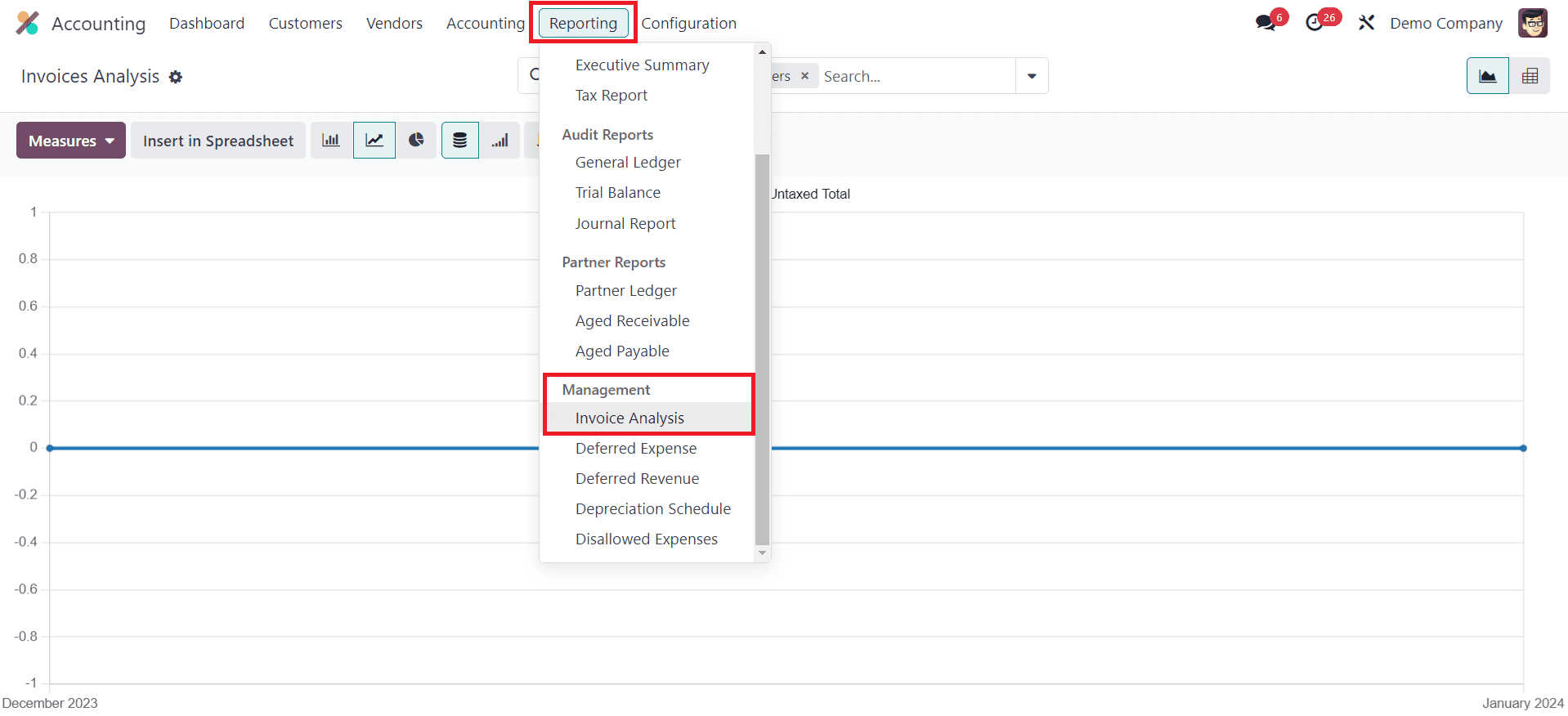
This platform enables the analysis of invoices, both those that have already been generated within the Accounting module and those currently in the draft stage of creation. Review the generated reports, interpreting the data presented in charts and graphs. Identify trends, anomalies, and opportunities for improvement or growth.
Odoo 17 presents your financial data in a visually appealing format, making it easier to interpret trends and patterns.
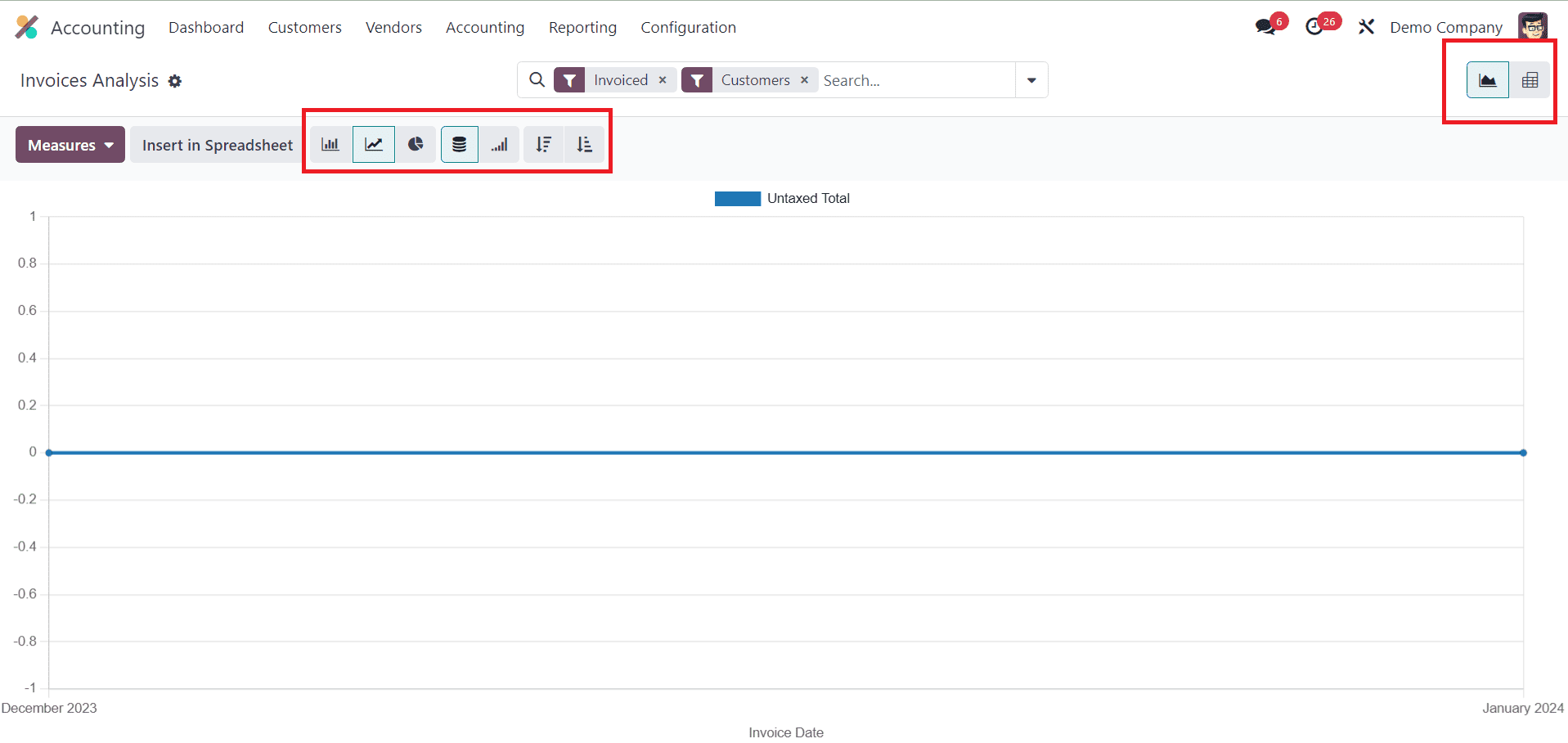
Odoo offers a versatile toolkit, presenting users with both Graph and Pivot views. Within the Graph view, the platform goes a step further by allowing users to seamlessly switch between different chart formats, including Pie, Bar, and Line charts. This dynamic feature enhances the user experience, providing flexibility in how invoice analysis reports are presented and enabling a more tailored approach to data interpretation based on individual preferences and analytical needs.
Odoo 17 Accounting offers a range of customization options, allowing you to focus on the key metrics that matter most to your organization. In Odoo’s Invoice Analysis, users benefit from powerful features like filters and group-by options, offering a comprehensive toolkit for refining and organizing data to meet specific analytical needs.
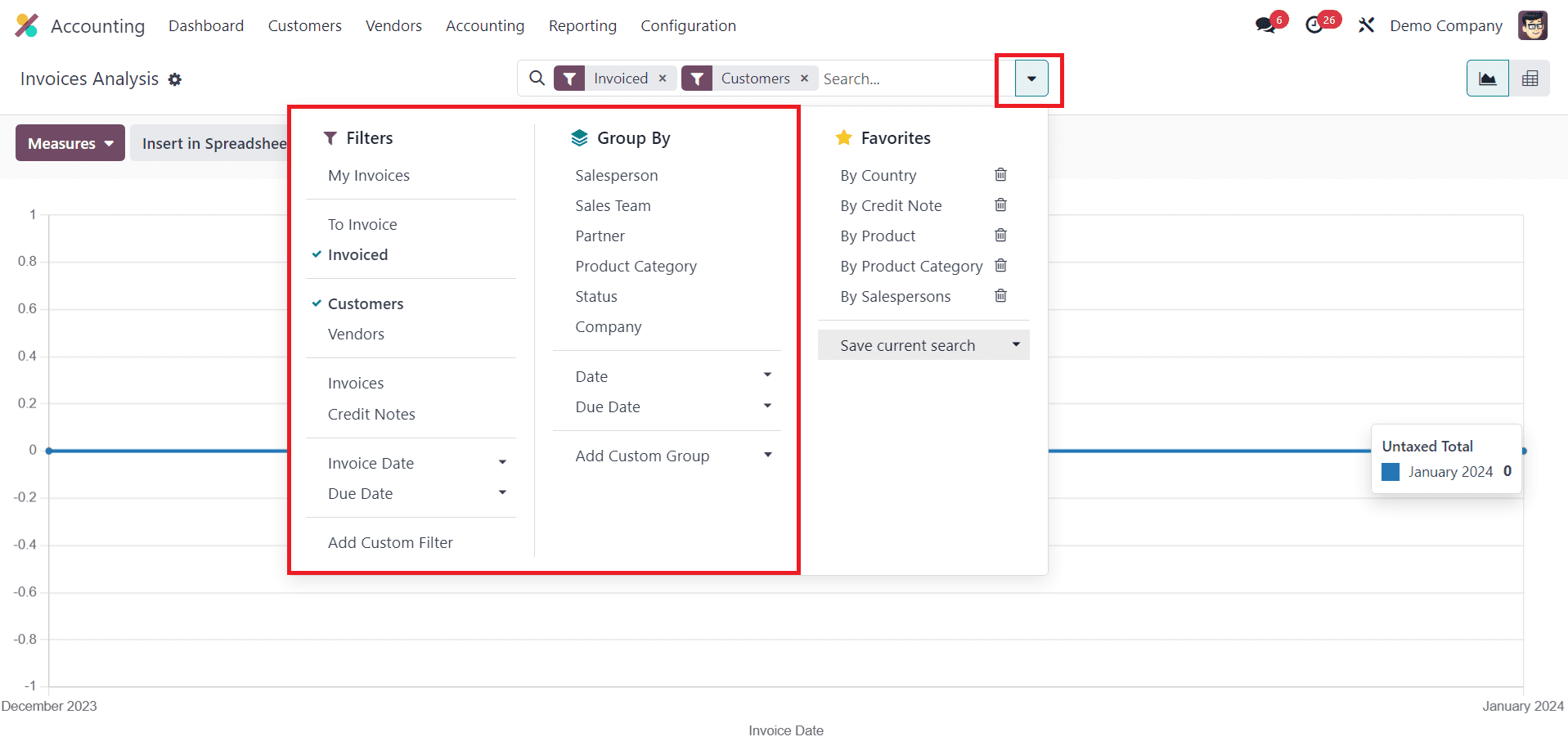
As depicted in the visual representation above, the predefined Filters encompass categories such as My Invoices, To Invoice, Invoiced, Customer, Vendors, Invoices, Credit Notes, Invoiced Date, and Due Date. Moving to the Grouping option, users can choose from Salesperson, Sales Team, Partner, Product Category, Status, Company, Date, and Due Date to organize and categorize their invoicing data based on specific parameters. This array of default Filters and Grouping options provides a robust foundation for users to streamline and customize their invoice analysis experience within the Odoo platform.
Analyze sales by product, customer, salesperson, or any other relevant parameter to gain a deeper understanding of your revenue streams.
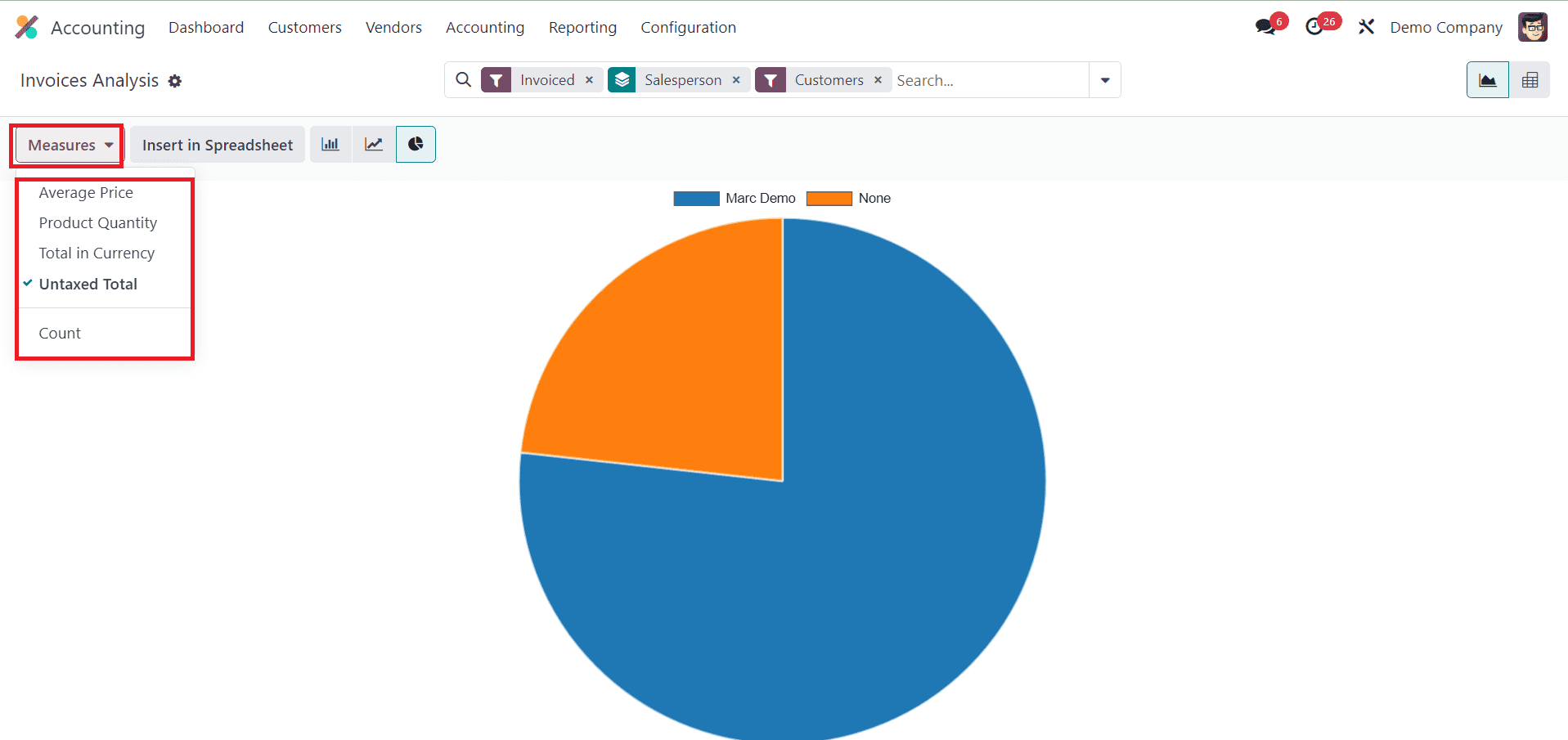
Odoo provides a set of Measures for comprehensive invoice analysis, including Average Price, Product Quantity, Total in Currency, Untaxed Total, and Count. Beyond the graphical view, users can delve into a more structured analysis using the Pivot view. This feature not only facilitates a detailed examination but also allows seamless grouping operations directly within the pivot table, offering enhanced flexibility in dissecting and understanding invoicing data.
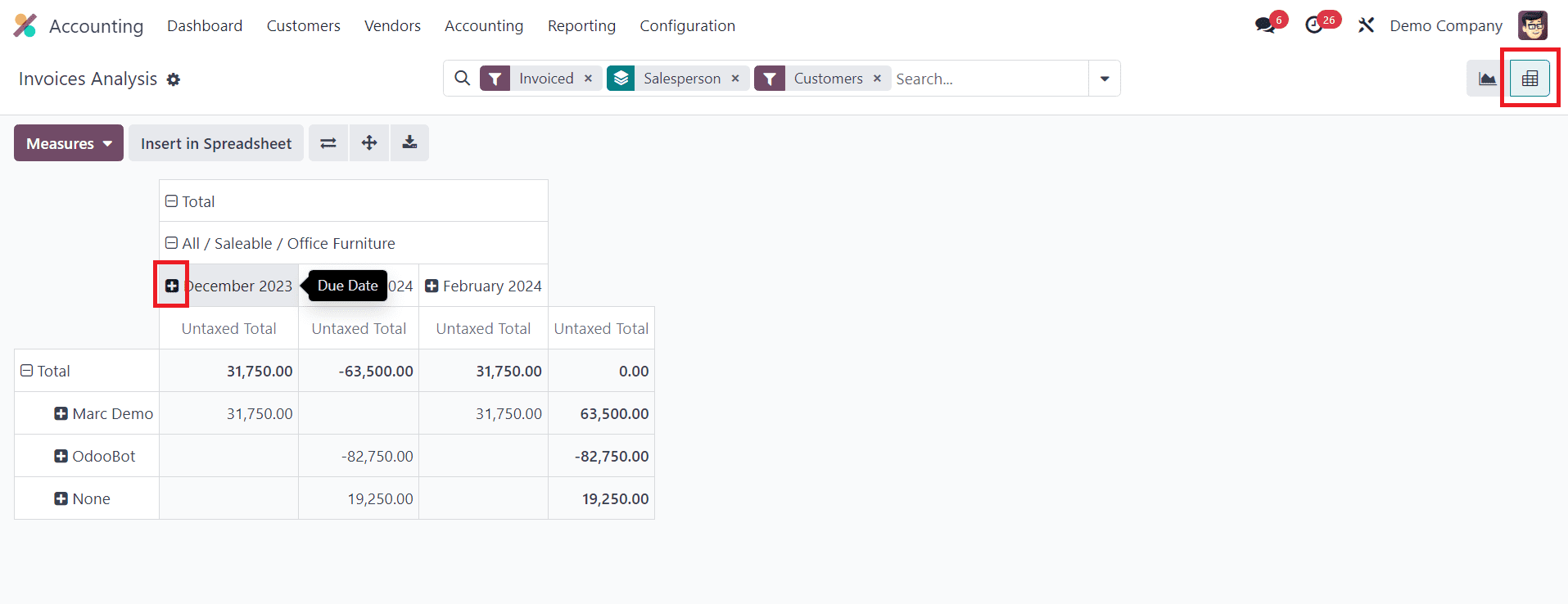
Expand or collapse the table view effortlessly with the provided + and – icons, as demonstrated in the image above. Elevate your analytical experience by utilizing the Custom options in the respective menus, empowering you to create personalized filters and grouping configurations tailored to your specific needs. Furthermore, refine the precision of your reports by selecting suitable measures using the Measure feature, ensuring a nuanced and insightful analysis of your invoicing data. This user-friendly customization capability enhances your ability to extract meaningful insights from the data presented within the Odoo platform.
Product Margin Reporting in Odoo 17
In Odoo, the product margin refers to the profitability of a specific product, calculated based on the costs associated with producing or procuring the product and the revenue generated from its sales. The Product Margin Analysis feature in Odoo’s Accounting Module allows businesses to assess and analyze the financial performance of individual products in a detailed manner.
The Product Margin Analysis can be used to view and analyze different margin metrics for individual products or across product categories. Users can set filters for specific date ranges, product attributes, and other parameters to customize their analysis. The interface provides visual representations such as tables, graphs, or charts, making it easier for businesses to interpret and act upon the insights gained.
Moreover, the drill-down functionality within the Product Margin Analysis feature allows users to access detailed transaction information for specific products, enabling a granular understanding of the factors influencing product profitability. To begin, users need to navigate to the Accounting module in Odoo. In the Accounting module, look for the ‘Settings’ menu. Find and select ‘Margin Analysis’ from the Analytics tab as shown in the image below.
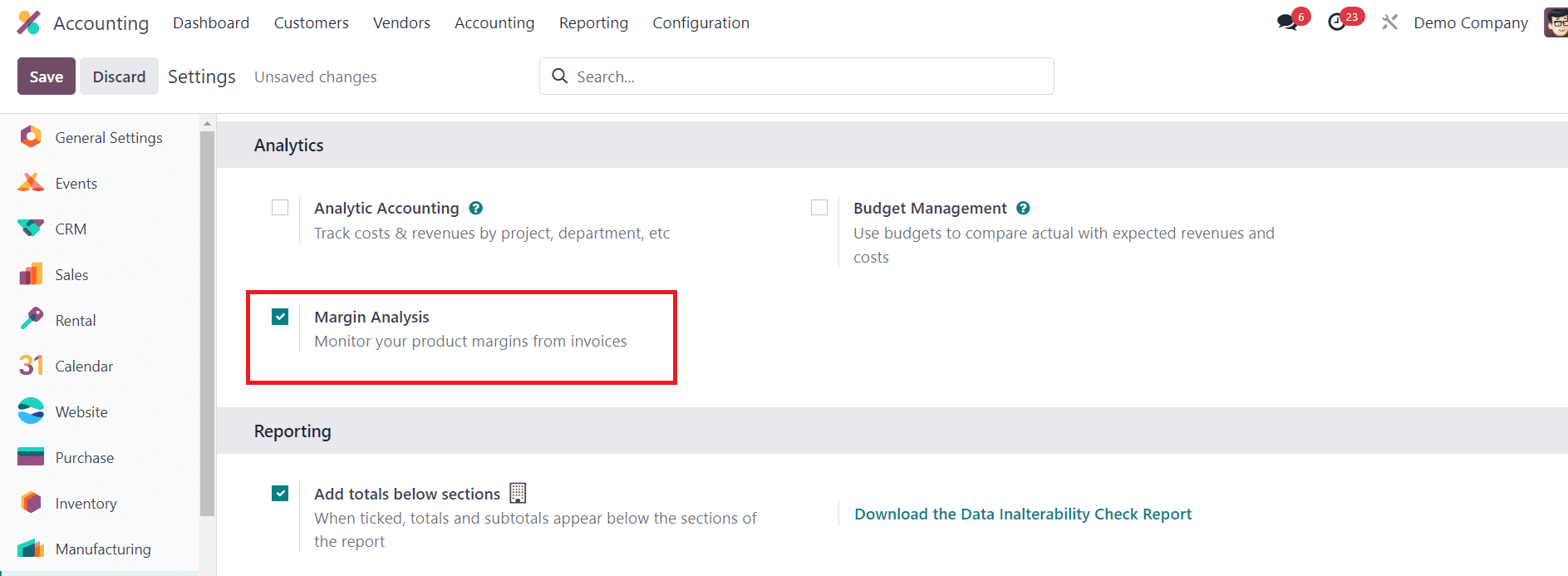
This feature in Odoo Accounting provides businesses with a powerful tool to monitor and analyze product margins directly from invoices.
Select ‘Reporting’ and then ‘Product Margin.
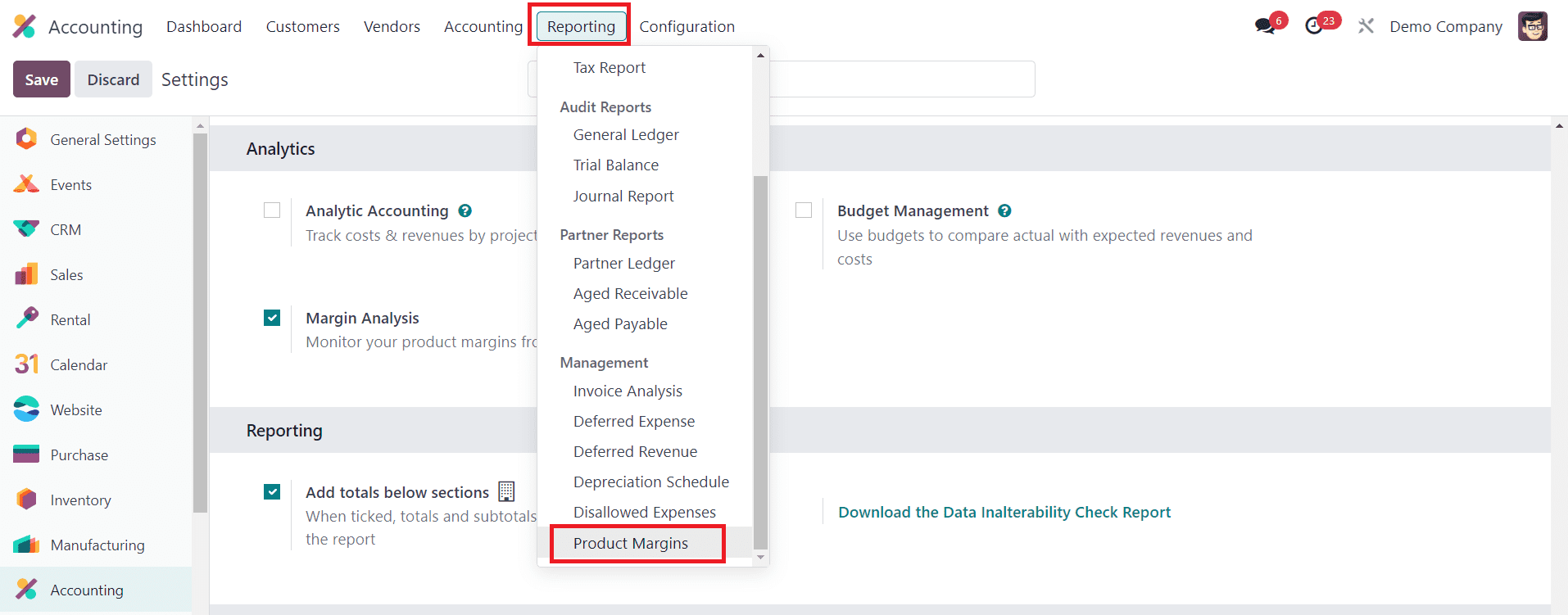
This will open a new pop-up window, as shown in the image below.

Input essential Product Margin details in the specified fields, including “From,” “To,” and Invoice State.

Utilize the dropdown menu to conveniently select an appropriate invoice state, such as Paid, Open and Paid, or Draft, Open and Paid. Opt for the “Open Margins” option to generate a comprehensive product margin report based on the chosen date range. The user-friendly interface allows for seamless customization, refining the analysis according to specified timeframes and invoice statuses.
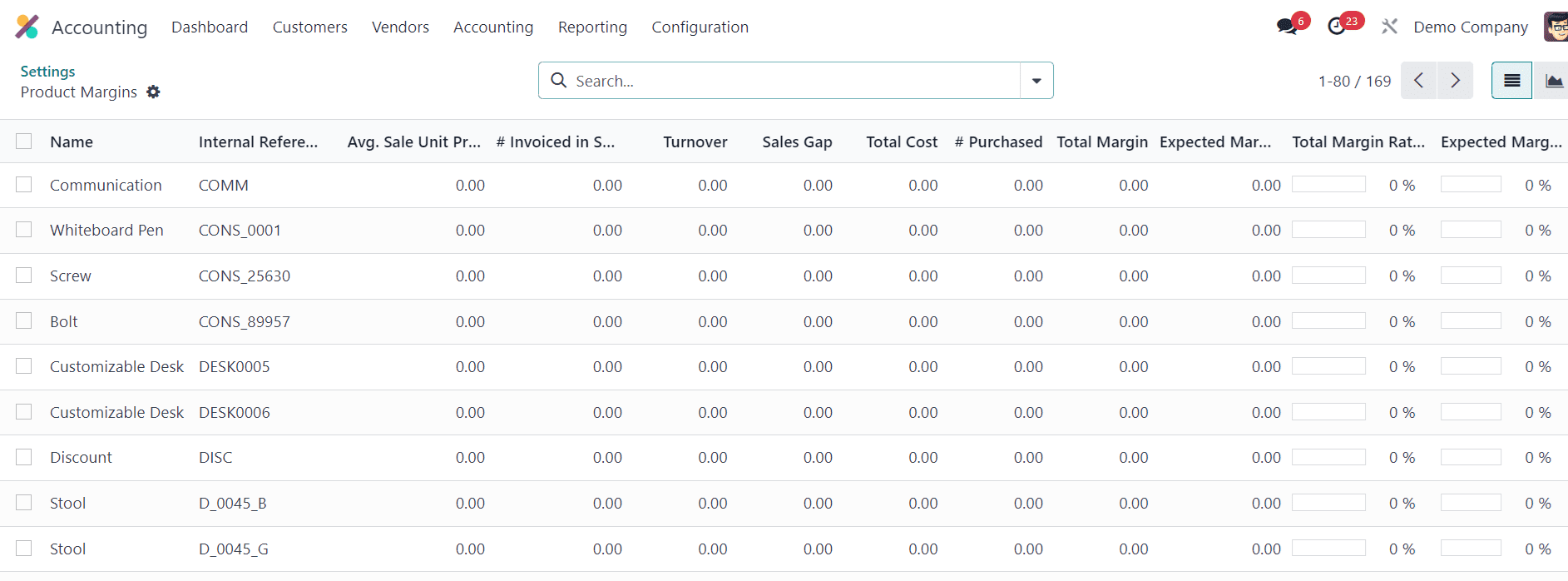
The report presents product details including the Product Name, Internal Reference, Average Sale Unit Price (average price in customer invoices), Quantity Invoiced in Sales (sum of quantity in customer invoices), Turnover (sum of the multiplication of invoice price and quantity in customer invoices), Sale Gap (Expected Sale – Turnover), Total Cost (sum of the multiplication of invoice price and quantity in vendor bills), Quantity Purchased (sum of quantity in vendor bills), Total Margin (Turnover – standard price), Expected Margin, Total Margin Rate, and Expected Margin Rate.
Users can customize the analysis based on their specific requirements. This includes filtering by Service, Products, Published, Available in POS, Available in Self, Not Available in Self, Can be Sold, Can be Purchased, Can be Recurring, Can be Rented, Can be Expensed, Favorites, Warnings, and Archived.
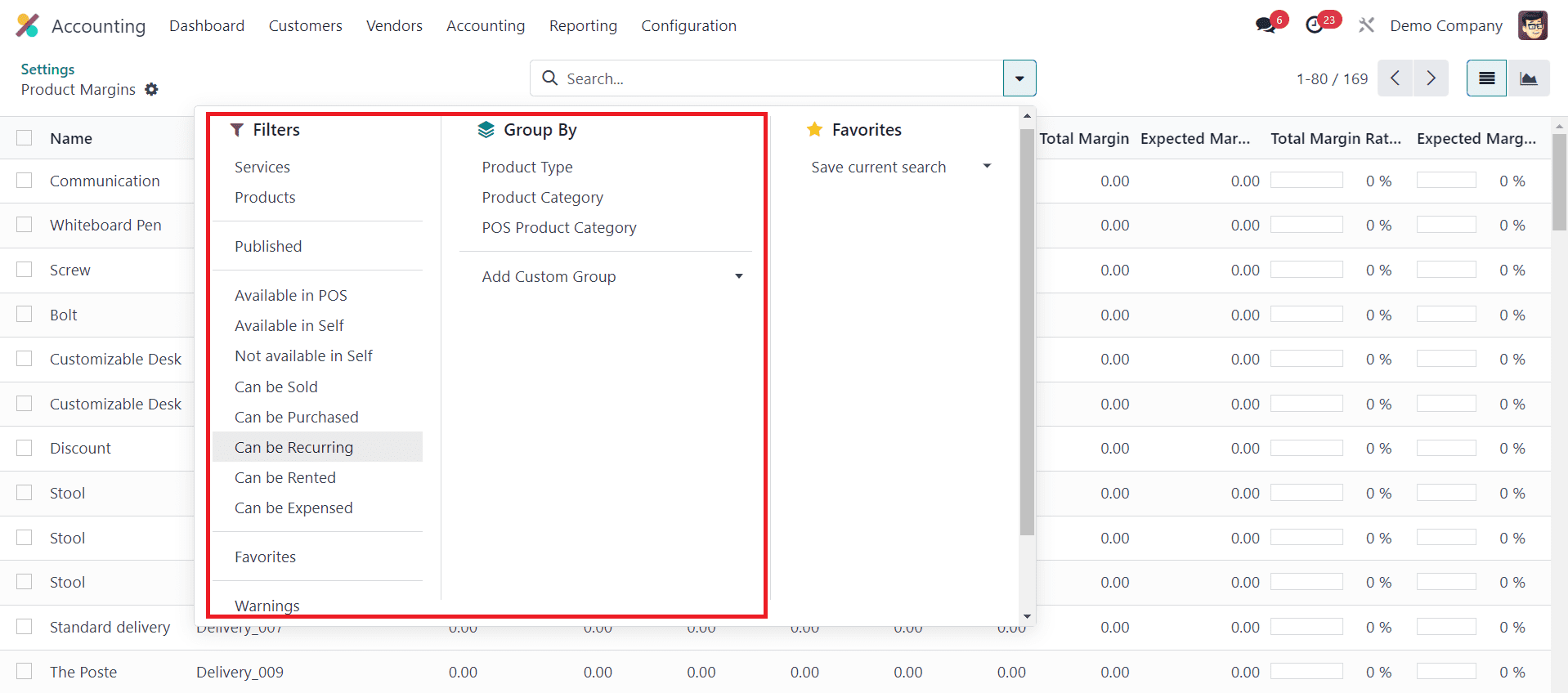
As a Group By option, you will get Product Type, Product Category, and POS Product Category. When you select products from the list, a new Action button will appear on the screen as shown in the image below.
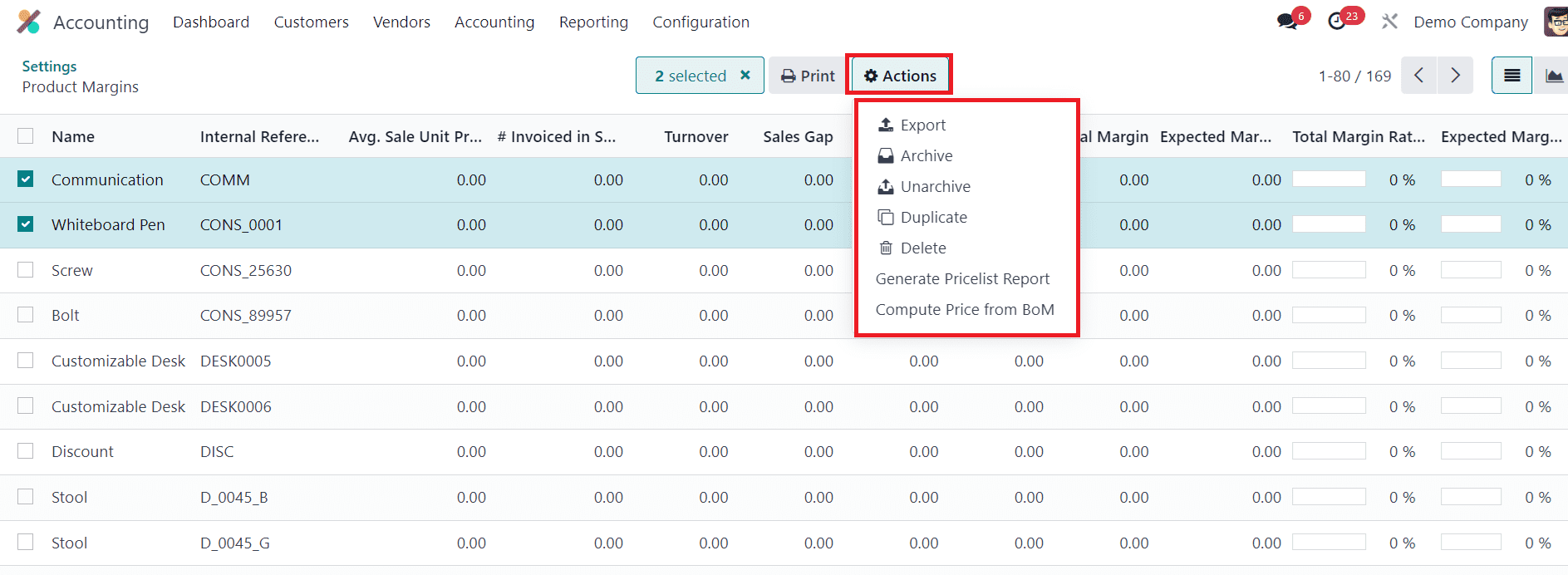
The Action button includes options such as Export, Archive, Unarchive, Duplicate, Delete, Generate Pricelist Report, and Compute Price from BOM.
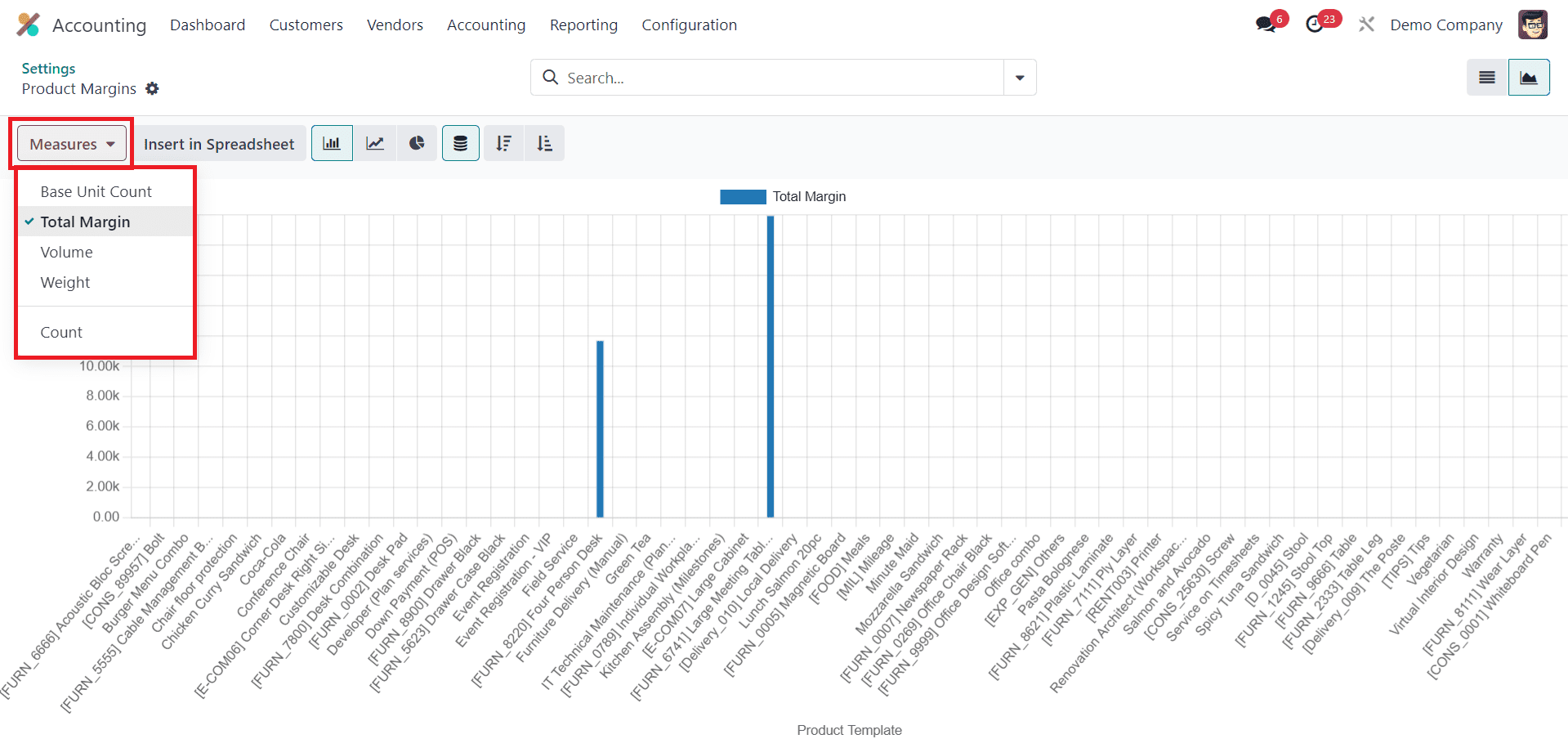
This is the Graphical view of the Product Margin window. You can use Base Unit Count, Total Margin, Volume, Weight, and Count as Measures on this platform.
Odoo 17 Accounting emerges as a powerful tool for businesses seeking efficiency, accuracy, and strategic insights. By leveraging its advanced features for invoice management and product margin analysis, businesses can streamline operations, enhance decision-making, and position themselves for sustainable growth in a competitive market.
Embrace the future of accounting with Odoo 17, and empower your business to thrive in the ever-evolving landscape of commerce.


